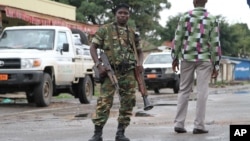An African Union official says the continental body and the rest of the international community will not sit by and watch the escalation of violence and human rights violations and abuses continue in Burundi.
Erastus Mwencha, deputy chairman of the African Union Commission said the peacekeepers, approved Saturday by the African Union Peace and Security Council are meant to prevent further violence and protect the citizens.
He was reacting to news reports that a Burundian government official said Sunday that his country will not agree to the deployment of African Union peacekeepers.
Deputy presidential spokesman Jean-Claude Karerwa told the French News Agency the AU peacekeepers would be considered "an invasion and occupation force.”
Mwencha said the AU is still waiting for a formal response from the Burundian government. But if news reports are true that Bujumbura has rejected an offer to deploy troops, it would be “a very sad development.”
“That is a very sad development because when the decision was taken Saturday, Burundi itself was given an opportunity to put across its case, and the decision was taken after due consideration of Burundi’s point of view,” he said.
The mandate of the 5,000 strong force known as the African Prevention and Protection Mission in Burundi is to create the enabling environment for dialogue among Burundian stakeholders to take place.
The U.N. Security Council Saturday urged all Burundian stakeholders to fully cooperate with the mission in support of the effective implementation of its mandate. It also called on African countries to pledge troops and police.
Mwencha said the job of any government is to protect its citizens, but he said the Burundian government has not shown it can protect all its citizens.
"It’s obvious everybody is aware that people are dying in Burundi, people dying in the streets, bodies being collected in some of the environs of Bujumbura, and the African Union force, if you look at the mandate, it is a prevention and protection. And that is really the responsibility of any government, but which we see is not happening. But if the situation continues, the African Union and international community cannot sit by and watch genocide if it is going to develop into that genocide,” Mwencha said.
He said if the four-day deadline imposed by the African Union for Burundi to formally respond to the deployment of force, the Peace and Security Council will look at the various options available to it.
“There is a very clear provision within the charter that the peace and security can resort to. But at this point in time because I know that a formal request has just been sent to Burundi, and I think we have to wait to see a formal response. We cannot go by what we hear in the media. We wait for a formal response and then we’ll cross the bridge at that point,” Mwencha said.
Both the African Union and the U.N. Security Council have called for “urgent acceleration” of the mediation efforts led by President Yoweri Museveni of Uganda on behalf of the East African Community (EAC) and urged all parties in Burundi to fully cooperate with the mediator.
Mwencha said the lack of progress in getting the dialogue off the ground is one of the reasons for the proposed African Prevention and Protection Mission in Burundi.
“If there was movement you will start to see the situation changing on the ground. That’s why the force is going there to create an environment for this dialogue to continue,” he said.




